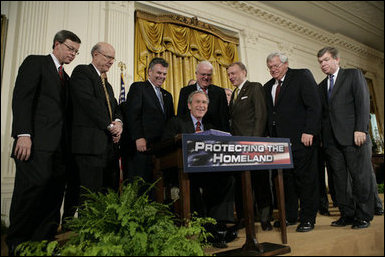 |
| Recovery workers surrounded by debris following the attacks |
 |
| George W. Bush renewing the Patriot Act in 2006 |
One of the most controversial sections concerned privacy rights covered by the Fourth Amendment. The Fourth Amendment protected ciitizens from unreasonable searches and seizures. It applied to "persons, houses, papers, and effects," which included modern communications devices. This meant federal agents couldn't place wiretaps on telephones without a search warrant. The Patriot Act allowed federal agents to obtain a single warrant for tapping all phones a suspect uses - a "roving wiretap."
Under the Patriot Act, agents with a warrant could search a suspect's home or business in secret. They could also use a National Security Letter (NSL) to acquire personal records from a number of sources, including banks, phone companies, credit agencies, and Internet providers. Previously, the FBI could only issue a NSL when investigating a foreign power or its spies.
 |
| A poster by the ACLU that accompanied an article on the Patriot Act |
In the wake of 9/11, it was necessary to improve national security measures. 9/11 undermined America and her position as the strongest nation in the world. Americans no longer felt safe in their own country. It raised many debates about how to balance our founding ideals of equality and liberty with our desire and security, many of which are still relevant today.
5 comments:
In times of fear, people are more likely to act a certain way if it is suggested that it is for the sake of safety. In this case the American people were looking for anyway to prevent another devastation after 9/11, thus paving the way for the Patriot Act.
Great job! This post was very informative and I was shocked to read that Congress was able to pass this act in a month and a half. Unfortunately, it seems like it is now easier for people privacy to be invaded due to this act. However, I think that it has had a net-positive effect on the United States.
Great summary and organization of information. This is very in depth and helps the reader understand the details comprising the origin of this act, the act in itself, and the controversy surrounding it.
The aftermath of 9/11 has impacted American society since the day it happened. This article is great and informative about how 9/11 impacted reforms in legislation and societal shifts.
Unknown was Me
Post a Comment